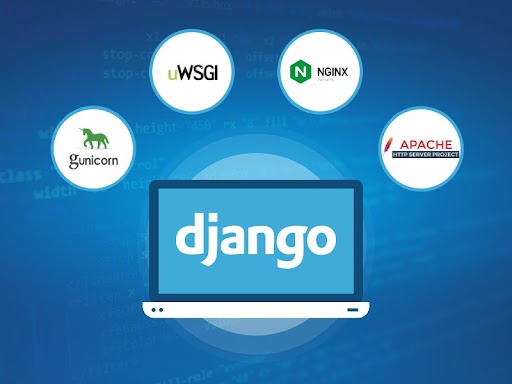Comparative Analysis of Best Django Backend Hosting Servers in 2025

The landscape of web development is witnessing a rapid change and the preference of developers is towards using technologies that can help build scalable web applications.
For a web platform such as content-based and news-based websites, eCommerce stores, and OTT, supporting the growing audience is also a concern. The search ends with Django, a python-based framework that is immensely popular these days.
Highly attributed for its simple, fast, reliable and scalable web app framework, a study by SimilarTech reveals that there are approximately 83,995 websites that were built with Django. The same study revealed the use of Django in different industry vertical – approximately 7.23% Science and Education business used Django in their web applications. In Computers Electronics & Technology it is 5.7%. While the use is 2.44% and 2.11% respectively for the Arts & Entertainment industry and Health industry.
Some popular companies using Django based websites that we all know about are: YouTube, Instagram, Disqus, Bitbutcket, Mozilla, Pinterest, and the list is endless.
In spite of this rising popularity, it should always be remembered that Django cannot function alone, it needs backend servers that are responsible for handling requests from users, processing data, and returning responses.
So, in this article, we will compare the popular Django backend servers namely Gunicorn, uWSGI, Nginx, Apache HTTP Server that fuel efficient and scalable web applications and understand what all each has to offer.
Understanding the Role of Backend Servers in Django Application
It is crucial to understand the role backend systems play in the Django development process before we delve deep into the specifics of this concept. A backend server typically processes requests from clients (web browsers) for performing necessary actions, sending queries to databases, and generating responses to the client’s queries or needs.
In layperson’s terms, the backend infrastructure bridges the frontend user interface and the backend database to build robust and scalable applications.
Django, is equipped with the necessary tools and structure to build the core logic of web applications by Django development services. Backend servers, hence, come to the scene when it is required to serve the application and handle tasks such as load balancing, security, and optimization. In the following part of the article we will learn about some popular backend servers for Python and Django in 2025.
Backend Servers for Django Applications
1. Gunicorn (Green Unicorn)
Gunicorn, an acronym for Green Unicorn, is an extensively used pre-forking HTTP server (Hypertext transfer protocol) for deploying Django websites. This server logic is reputed for being streamlined, efficient, and reliable. You will surely find a good python web development company heavily using it as it can adapt well to multiple web frameworks.
Following are some notable features of Gunicorn:
- Concurrency: This backend server supports various worker models to handle multiple requests concurrently. This ensures that the API can handle a higher volume of requests without becoming overwhelmed.
- Pre-forking: The server is designed with a pre-forking model wherein multiple worker processes are created beforehand. Thus, the overhead of process creation is reduced, which enhances the performance of the application.
- Logging and Monitoring: This backend server has the feature of detailed logging and monitoring. It also includes a web-based interface for monitoring the server status and performance of the application.
- Graceful Restart: Gunicorn supports graceful restarts, allowing new code to be loaded without abruptly interrupting ongoing requests.
- Adaptable Configuration: Developers can configure Gunicorn using command-line options or configuration files, tailoring it to their application’s requirements.
Also Read: Key Considerations for Selecting Django Packages
Use Case:
Gunicorn can serve as an appropriate backend server for a wide range of Django frameworks, from small projects to large-scale web applications. Its ability to efficiently handle concurrent requests makes it ideal for applications with varying traffic loads. Because of its adaptable configurations, Gunicorn can be easily teamed up with reverse proxy servers like Nginx or Apache.
2. uWSGI
uWSGI is an open-source software application server and gets its name from Web Server Gateway Interface (WSGI). This Django server is compatible with various other web frameworks like Python and PHP and delivers high performance and flexibility, which makes it a favored choice for deploying Django-based web applications.
Following are some notable features of uWSGI:
- Protocol Support: uWSGI is a highly scalable server that supports multiple protocols for communication. It acts as a middleware between the web server and the application, thereby enabling versatility during application deployment.
- Application Containerization: uWSGI has the feature of containerizing applications; a developer can isolate them from the host system and other applications. This feature enhances the security and manageability of the application.
- Caching and Content Delivery: uWSGI is equipped with caching mechanisms that significantly enhance the speed of the application. This feature of the backend server additionally supports content delivery offloading tasks such as serving static files to improve efficiency.
- Theming: uWSGI supports theming, allowing developers to customize the server’s appearance to match the application’s branding.
Use Case: uWSGI is well-suited for applications that demand high performance and the need to handle many requests. Its versatility makes it an excellent choice for projects with complex deployment requirements.
3. Nginx
Nginx is another popular backend server that additionally functions as a proxy server. Though not a Python-specific server, it can be yoked with Django applications to manage complex tasks like load balancing, caching, and SSL termination.
The following are some notable features of Nginx:
- Reverse Proxy: Nginx is designed to function as a reverse proxy server. It can forward requests to the other applicable backend server, as established by the routing rules of the developer.
- Load Balancing: This backend server is capable of distributing incoming requests across multiple backend servers. It can additionally optimize resource utilization and improve application responsiveness.
- Caching: Nginx supports caching static content. Hence, the load on backend servers is reduced. It also enhances the overall performance of the application.
- SSL Termination: Nginx is capable of handling SSL termination. It decodes HTTPS (Hypertext transfer protocol) requests and forwards them to backend servers over the same.
Use Case: Nginx is typically used in conjunction with backend servers like Gunicorn or uWSGI. This capability provides it additional functionality such as load balancing and caching. It is highly suitable for applications that have high availability and scalability.
4. Apache HTTP Server
Apache HTTP (Hypertext transfer protocol) is one of the oldest and sturdiest backend web servers. Commonly known as Apache, it is not as lightweight as the other backend servers but it features flexibility and robustness, which sets it apart from others.
- Module Support: Apache features a modular architecture that enables developers to extend its functionality through modules. Hence, features such as authentication and URL rewriting can be implemented quickly.
- Flexible Configuration: This backend server has a flexible configuration that provides fine-grained control over the server behavior, thus making it suitable for complex setups.
- Security: Apache strongly focuses on security and provides features like authentication and access control to protect applications and data.
Use Case: Apache can be a backend server for Django applications when specific features or configurations are required. It’s a good fit for projects that demand sophisticated customization and security.
Comparing the backend hosting services suitable for Django applications
The best Django backend server for your application will depend on your specific requirements. Here are some factors to consider when making your decision. The table below will help you compare the backend servers that work well with Django applications:
| Server | Type | Pro | Con |
|---|---|---|---|
| Gunicorn | WSGI HTTP server | Simple and easy to use. Designed to be used with Python applications. Provides good performance for most use cases. Often used in combination with Nginx for serving static files. | Doesn’t handle serving static files efficiently. Might not be the best option for high-traffic applications without additional tuning. |
| uWSGI | Application server and protocol | Highly configurable and supports various protocols. Can be used with multiple languages, not just Python. Supports a wide range of deployment configurations. Provides fine-tuned process management and application isolation. | Configuration can be complex for newcomers. Requires more tuning for optimal performance compared to Gunicorn in some cases. |
| Nginix | Web server and application server | Versatile server with multiple features. Can serve as a reverse proxy and handle load balancing. Well-established and widely used. Supports various modules and extensions. | Can be resource-intensive, especially in comparison to lighter-weight options like Gunicorn and uWSGI. Configuration can be complex, especially for newcomers. Not as specialized for Python applications as other options. |
| Apache | Web server and reverse proxy server | Excellent at serving static files and acting as a reverse proxy. Lightweight and efficient, handles high traffic well. Often used in combination with Gunicorn or uWSGI for deploying Django apps. Configuration syntax is generally considered more readable and intuitive than some other servers. | Doesn’t natively support running Python applications like Gunicorn and uWSGI do. In some cases, might need additional modules to fully support Python applications. |
Choosing the Right Django Backend Hosting Service
To choose a suitable backend server for a Django-based web application, you should consider various factors to ensure that the application delivers optimal performance, is scalable, and offers ease of management. One important factor is how well a server complies to Django security best practices.
Here are some steps that will help you to make the right choice:
- Performance Requirements: Consider the expected traffic and load on your application. High-traffic sites might require more efficient servers that can handle more concurrent requests.
- Ease of Deployment: Evaluate how easily you can integrate the chosen server into your deployment pipeline. Some servers might require additional setup or modifications to your deployment process.
- Community and Documentation: Check the size and activity of the community for each server. Active communities often mean better support, updates, and plugins/extensions.
- Monitoring and Management: Evaluate each server’s monitoring and management tools. Monitoring server health and managing processes is essential for maintaining a healthy application.
- Resource Usage: Analyze how much system resources (CPU, memory) each server typically uses. This is especially important if you are in a resource-constrained environment.
- Compatibility: Ensure the server you choose is compatible with the rest of your technology stack. For example, if you use Nginx as a reverse proxy, ensure it can work seamlessly with your chosen backend server.
- Scalability: Consider whether the server can scale horizontally (adding more servers) or vertically (adding more resources to a server) as your application’s demand grows.
- Security: Research the security features and best practices provided by each server. Security is crucial for protecting your application and user data.
- Concurrency Model: Determine whether your application requires a process-based concurrency model (like Gunicorn) or a more flexible threaded model (like uWSGI).
- Server Configuration and Tuning: Evaluate your familiarity with each server’s configuration. Some servers, like Gunicorn, are designed to be straightforward to configure, while others, like uWSGI and Apache, offer more advanced configuration options. Consider the complexity of tuning. Some servers might require more fine-tuning to achieve optimal performance than others.
- Application Isolation: If you’re running multiple applications on the same server, consider the isolation provided by each server. uWSGI, for example, allows for more isolated processes, reducing the risk of interference between applications.
- Server Features: Determine if you need additional features beyond serving the Django application, such as load balancing, SSL termination, or caching. Servers like Apache and Nginx offer a broader range of features beyond just running the application.
- Static File Handling: Consider whether your application serves a significant number of static files. Nginx is known for its excellent fixed file handling, which can offload this task from the application server.
In practice, many Django applications are deployed using a combination of servers. For instance, using Nginx as a reverse proxy in front of Gunicorn or uWSGI for serving the Django application. This allows Nginx to handle tasks it excels at (like static files and load balancing) while the application server focuses on executing the Django code.
So, your choice of backend server should be based on a careful evaluation of your application’s specific requirements, your team’s expertise, and the trade-offs that each backend server offers. Consider setting up a test environment to benchmark and compare performance under realistic conditions before making your final decision.
You can also hire a trusted software development agency that will help you with your requirements.
Bottomline to using Backend servers for Django Web Development
Django backend servers play a pivotal role in a web application’s performance, scalability, and efficiency. The choice of backend server depends on the specific requirements of your Django project, the expected traffic load, and the desired level of customization.
Whether you opt for the simplicity of Gunicorn, the performance of uWSGI, the versatility of Nginx, or the flexibility of Apache, each backend server brings its own strengths to the table.
If you want to know more about Django hosting services, you can take help from communities like GitHub where you can access open source Django projects, guides and documentation related to the technology.
Additionally you can connect with our development experts or write to us at info@finoit.com.


